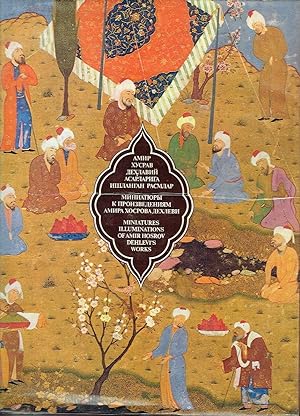YUSUPOV, E YU , EDITOR (3 resultados)
Tipo de artículo
- Todo tipo de artículos
- Libros (3)
- Revistas y publicaciones
- Cómics
- Partituras
- Arte, grabados y pósters
- Fotografías
- Mapas
-
Manuscritos y
coleccionismo de papel
Condición
- Todo
- Nuevos
- Antiguos o usados
Encuadernación
- Todo
- Tapa dura
- Tapa blanda
Más atributos
- Primera edición
- Firmado
- Sobrecubierta (2)
- Con imágenes del vendedor (1)
- Sin impresión bajo demanda
Ubicación del vendedor
Valoración de los vendedores
-
Miniature Illuminations of Nisami's "Hamsah".
Publicado por Fan, Tashkent, 1985. Text in Russian, Uzbek and English., 1985
Librería: Much Ado Books, Alfriston, SUSSE, Reino Unido
Hardback. Colour illustrations. Very Good in Very Good Dust Jacket. DJ protected by high-grade removable clear cover. No owner's markings. Oversize; Postage & Packing may cost extra.
-
Miniatures Illuminations of Amir Hosrov Dehlevi's Works
Publicado por Fan, Tashkent, Uzbek SSR, 1983
Librería: Versandantiquariat Funke, Dresden, Alemania
Libro
Condición: guter bis sehr guter Zustand. F. guter bis sehr guter Zustand, geringe Gebrauchs- und Alterungsspuren: Deckel an der unteren Ecke leicht angeknickt - Schutzumschlag gering defekt "Amir Hosrov Dehlevi was one of the greatest of all writers who wrote in the Persian language in the Middle Ages. His poetry was a link in the chain of literary contacts of various times and peoples. As it is impossible to imagine Dehlevi's "Pentameter" without Nizami Ganjawi's "Hamsah", one cannot conceive the works of Abdurrahman Jami, Alisher Navoi and other poets who wrote in Persian and Turkic without the epic works of Amir Hosrov Dehlevi. His works led to the foundation and golden age of Indian literature in the Persian language, and favoured the development of literary contacts between the peoples of Middle and Central Aisa and propagating on a large scale epic poetry of romantic and realistic trend in the Persian language. The spreading of literature in the Persian language through India was bound up with the emergence of a number of states which were ruled by persons of Central Asian extraction and the adoption of Persian as the state language. Gifted scholars, poets and musicians were gathered at the courts by the rulers of the Turkic dynasty. Among them were such distinguished writers as Tadjiddin, Shikhabiddin Badayuni and Khodja Amididdin Sanami, whose literary productions paved the way for the development of Amir Hosrov Dehlevi's creative work. Yaminiddi Abul Khasan Amir Hosrov Dehlevi was born in Patiala in 1253. Amir Saifiddin Mahmud, the poet's father of Turkic descent, was born in the Central Asian town Kesh (Shakhrisabz). During the Mongol invasion he found refuge in India. He served at the palace of Delhi sultans conscientiously, for which he was held in respect and awarded the title "Amir". Saifiddin Mahmud fell in battle against the Mongols in 1261. Yaminiddin, who was eight years old at the time, was brought up by his grandfather who educated him well for his time. Hosrov Dehlevi's youth concurred with the rule of Giyasiddin Balban (1265-1287) ." Seitenanzahl: 132 Seiten mit 117 Bildern Format: ca. 24,5 x 33,5 Kunstleder Englisch; Russisch; Usbekisch.
-
Miniatures Illustrations of Alisher Navoi's Works of the XV-XIXth Centuries
Publicado por Fan, Tashkent, Uzbekistan, 1982
Librería: Mullen Books, ABAA, Marietta, PA, Estados Unidos de America
Hardcover. Condición: VG / VG. Brown cloth with gilt titling at spine and gilt decoration to front cover; Color illus. dj.; Illus. endpapers; Approx. 300 pp.; 200+ color color illustrations. Text provided in Uzbek, Russian, and English. Alisher Navoi was an Uzbek who is considered the Father of Uzbek literature. "Alisher Navoi one of the greatest poets of the Medieval East, a statesman, and the founder of Uzbek literature. As a statesmen he is credited for founding, donating, or restoring some 400 religious, educational, and charitable institutions in Khorasan, including mosques, schools, libraries, hospitals, bridges, pools and caravan-serais. He wrote numerous lyrical poems, gazelles, prose work and scientific treatises, mostly in Chagatay (Middle Turic), the language he shaped as classical by importing the elegant style of classical Persian. Chagatay as an official language, started with the publication of Navai's first collection of poetry 1465. Uzbeks, whose language is descended from Chagatai, claim him to be their national poet. During his career, he wrote 30 works, consisting of about 50 000 verses and a few technical works." These miniatures are illustrations done to complement Navoi's writings. The book includes stunning plates, mostly full-page, and thorough text. Although artists' names are not listed for each illustration, some are included in the text as known calligraphers who worked during the time and worked on Navoi's writings. Really a fascinating look into history, art, writing, illustration, language, and more.



